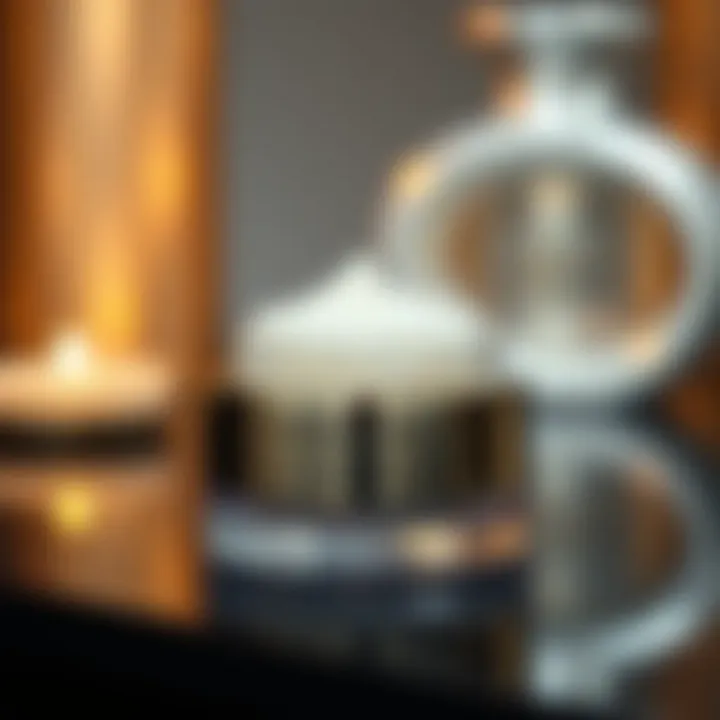Choosing the Best Night Cream for Mature Skin


Intro
In this article, we will explore the specific needs of older skin, shining a light on key ingredients that are most beneficial for nighttime use. Recognizing these elements can help ensure your skin receives the nourishment it craves while you sleep, leaving you with a dewy glow by morning. We'll also take a closer look at various products on the market, enabling readers to make informed decisions regarding their skincare regimen.
The necessity for a targeted approach to skincare cannot be overstated. As skin undergoes changes, it requires formulations that cater to its unique challenges—like dryness, fine lines, and a lack of elasticity. So, let’s dive into the essential aspects of choosing the best nighttime moisturizer for mature skin.
Understanding the Changing Needs of Aging Skin
Aging skin has distinct characteristics and needs that evolve over time, making the understanding of these changes essential for effective skincare. As women navigate through various stages of life, their skin undergoes transformations that can affect its appearance, texture, and overall health. Recognizing these alterations can help in selecting the most suitable nighttime moisturizer, thereby maintaining hydration and minimizing the visible signs of aging.
Why Understanding Aging Skin Matters
Understanding how and why skin changes as women age is crucial. For starters, the natural aging process leads to a decrease in collagen and elastin production, which are the proteins responsible for skin's firmness and elasticity. Additionally, changes in hormone levels can result in dryness, thinning skin, and increased visibility of fine lines. Knowing these facts enables a thoughtful approach to skincare and empowers women to make informed decisions about products and routines.
Common Skin Concerns in Older Women
As women age, several skin issues often come to the forefront. Some common concerns include:
- Dryness: Decreased oil production may lead to parched skin, making it essential to focus on moisturizers that deliver rich hydration.
- Fine Lines and Wrinkles: The skin's natural aging process can result in the formation of lines around the eyes, mouth, and forehead. These imperfections often reflect a need for nourishing ingredients that can aid skin's renewal.
- Uneven Skin Tone: Sun damage and hormonal fluctuations can create discoloration and age spots, which may warrant targeted treatments within a nighttime regimen.
- Thinning Skin: Older skin may lose its plumpness, appearing more fragile and susceptible to environmental damage.
Identifying these concerns early can shape a skincare routine that not only addresses existing issues but also actively works to prevent future ones.
How Skin Texture and Elasticity Alter Over Time
Understanding how skin texture and elasticity evolve is pivotal in choosing the right products. With age, skin can become rougher, and the ability to retain moisture diminishes. These changes can be attributed to:
- Declined Cell Turnover: The natural sloughing off of dead skin cells slows down, leading to dullness. Including exfoliating ingredients in a routine can help to refresh the skin's appearance.
- Loss of Structure: As collagen production reduces, skin can sag or exhibit lines. This necessitates the incorporation of firming agents in a nighttime moisturizer to rejuvenate skin's appearance.
Changes in elasticity contribute to sagging and the formation of deeper wrinkles. Therefore, skincare aimed at bolstering elasticity—such as those with peptides or vitamin C—should be prioritized.
The skin journey is unique for every individual, but addressing these common concerns through awareness and informed product selection can lead to healthier, more resilient skin. The key lies not just in hydration, but in nourishing the skin with the right ingredients that truly cater to its evolving needs.
What Constitutes an Effective Nighttime Moisturizer?
When it comes to skincare, particularly for mature skin, choosing the right nighttime moisturizer is not just a matter of preference, it's essential. As we age, our skin undergoes significant changes, moving towards a drier, more delicate state. This makes it critical to select a product that not only hydrates but also nourishes the skin. An effective nighttime moisturizer should maintain moisture levels, support the skin's barrier, and target specific signs of aging like wrinkles and uneven texture. Think of it as a nightly defense, working while you sleep to keep you looking your best.
Hydration vs. Nourishment
Hydration and nourishment might seem like two sides of the same coin, but they serve distinct roles in the skincare realm. Hydration primarily focuses on increasing the water content of the skin. This can help plump up fine lines, making them less noticeable. However, while hydration is crucial, it’s not the entire picture.
Nourishment goes deeper. It involves providing the skin with the essential nutrients it needs to repair and rejuvenate overnight. Mature skin often craves ingredients that encourage cellular turnover, replenish lipids, and offer antioxidants for protection against environmental damage. A winning combination would include both hydration and nourishment. Look for products that list humectants like glycerin or aloe vera for hydration, alongside nourishing agents like ceramides or oils for a fuller, richer effect.
The Role of Occlusives, Emollients, and Humectants
To effectively understand what makes a good nighttime moisturizer, we need to break down three key components: occlusives, emollients, and humectants. Each plays an important role in skin health.
- Occlusives are the heavyweights of the moisturizing world. They form a barrier on the skin, preventing water loss. Ingredients like petrolatum, beeswax, or shea butter fall into this category. They’re invaluable for those with very dry skin, as they lock in moisture, providing a protective layer.
- Emollients serve to soften and smooth the skin. They fill in the gaps between skin cells, enhancing texture and making the skin feel supple. Look for emollients like jojoba oil or squalane, which mimic the skin's natural oils and can help restore a youthful appearance.
- Humectants attract moisture from the air into the skin. Ingredients such as hyaluronic acid and aloe vera gel help bind water to the skin, ensuring it remains hydrated. Humectants are particularly beneficial in drier climates and can provide that much-needed boost to parched skin.
In summary, a well-rounded nighttime moisturizer will often include a harmonious blend of these three components, creating a moisture-locking powerhouse that addresses various needs of mature skin.
An effective nighttime moisturizer does more than just hydrate; it revitalizes and strengthens the skin's barrier, providing both immediate and long-term benefits.
Key Ingredients to Look For
When it comes to selecting a nighttime moisturizer for mature skin, understanding the key ingredients is paramount. Aging skin often requires more than just hydration; it craves specific nutrients that address the unique challenges it faces. This section will delve into essential components that are not only beneficial but can also significantly impact the efficacy of your nighttime skincare routine.


Retinol and its Benefits
Retinol, a derivative of vitamin A, is like a golden ticket for your skin when it comes to anti-aging. This powerful ingredient works by promoting cell turnover, which can lead to a smoother and more even skin texture. One of the most notable advantages of retinol is its ability to stimulate collagen production. As collagen levels decline with age, incorporating retinol in a nighttime moisturizer can help plump the skin, reducing the appearance of fine lines and wrinkles.
However, it's worth noting that retinol can sometimes irritate sensitive skin. It’s wise to start with a lower concentration and gradually work your way up. Additionally, those with reactive skin should consider patch testing before full application.
Peptides: The Building Blocks for Youthful Skin
Peptides are short chains of amino acids that serve as the building blocks of proteins like collagen and elastin. These proteins are crucial for maintaining skin's firmness and elasticity. As we age, the levels of these proteins diminish, leading to sagging and wrinkles. By incorporating peptides into your nighttime moisturizer, you’re essentially sending a message to your skin to boost its repair processes.
- Types of Peptides: Some famous examples include palmitoyl pentapeptide-4 and acetyl hexapeptide-8. Each type has its own benefits, from enhancing skin barrier function to reducing inflammation.
- Results You Can Expect: Consistent use of peptide-infused products may lead to visibly lifted and firmer skin over time.
Hyaluronic Acid: Ultimate Hydration
Hyaluronic acid is another powerhouse ingredient that is essential for mature skin. Its outstanding ability to retain moisture makes it invaluable, as it can hold up to 1,000 times its weight in water. This not only hydrates the skin but also contributes to a plumper appearance, giving your face a youthful glow.
It works best when applied to damp skin, as it can draw in moisture from the environment. Therefore, using a hyaluronic acid moisturizer at night can help ensure your skin stays hydrated throughout the night when it's in its repair mode.
Antioxidants and Their Protective Properties
Antioxidants are vital in combating free radicals, which can accelerate aging and damage skin. By incorporating antioxidants such as vitamin C, green tea extract, or coenzyme Q10 into your nighttime moisturizer, you help protect your skin against environmental stressors that can lead to premature aging.
- How They Work: These superheroes neutralize harmful free radicals and can also promote skin repair and rejuvenation. For instance, vitamin C doesn’t just offer protection; it also aids in brightening the skin and evening out tone.
- Daily Use: Regular application of antioxidants in your evening routine can create a strong defense against the signs of aging while supporting your skin’s overall health.
"Choosing the right ingredients is like setting the foundation for your skincare house; get it right and everything else falls into place."
Product Recommendations for Nighttime Moisturizers
Choosing the right nighttime moisturizer is more than just a matter of personal preference. It's a vital step in any skincare routine, especially for mature skin. As skin ages, its ability to retain moisture diminishes, resulting in dryness, dullness, and sometimes irritation. Therefore, specific product recommendations for nighttime use become essential for hydration and rejuvenation.
A well-formulated nighttime moisturizer can help address multiple concerns simultaneously. Not only does it provide hydration, but it also delivers active ingredients that perform optimally while you sleep. This section navigates the terrain of both luxury and budget-friendly options available in the market, ensuring that readers are well-equipped to make an informed decision that aligns with their skin's unique needs.
Top Rated Options in the Market
When it comes to premium skincare, certain products consistently rise to the top. These nighttime moisturizers have garnered rave reviews for their effectiveness in combating the visible signs of aging. Here are some noteworthy options:
- CeraVe Skin Renewing Night Cream: This cream draws on the power of essential ceramides and hyaluronic acid, which work hand-in-hand to rebuild the skin's barrier while trapping moisture.
- Olay Regenerist Retinol 24 Night Moisturizer: This moisturizer combines retinol with niacinamide. It's ideal for those looking to reduce fine lines and achieve visible firmness without causing irritation.
- Drunk Elephant Lala Retro Whipped Cream: Known for its unique blend of six African oils, this cream promises deep hydration and rejuvenation, making it a favorite for many.
While choosing a top-rated moisturizer, consider how your skin reacts to specific ingredients and whether you are looking for something targeted towards hydration, anti-aging, or a combination of both.
Budget-Friendly Alternatives
It's a common misconception that effective skincare comes with a hefty price tag. Fortunately, there are remarkable budget-friendly alternatives that are just as effective at keeping mature skin moist and vibrant:
- Neutrogena Hydro Boost Gel-Cream: A lightweight formula enriched with hyaluronic acid, this gel-cream absorbs quickly and provides long-lasting hydration, making it ideal for those who dislike heavy textures.
- L’Oreal Paris Revitalift Anti-Aging Night Cream: Contains both pro-retinol and hyaluronic acid, this cream delivers smoothing benefits without breaking the bank.
- Aveeno Positively Radiant Overnight Hydrating Cream: A great option with nourishing soy and moisture-rich ingredients, this cream helps even skin tone while providing overnight hydration.
Using these budget-friendly options does not diminish your skincare regimen. Rather, it allows you to personalize and modify your routine based on your skin's evolving needs.
Finding a moisturizer that works for you is like hunting for treasure; knowing what to look for elevates your chances of striking gold.
Integrating a Nighttime Routine with Other Products
Integrating other products into your nighttime regimen isn't just a nice-to-have; it’s a fundamental piece of the puzzle when you're managing mature skin. In simpler terms, what you put on your face at night can make or break your skin's appearance the following day. The importance of combining various products effectively can lead to optimal hydration, rejuvenation, and overall skin health.
A moisturizer alone may offer a layer of hydration, but when integrated with cleansers, exfoliators, serums, and treatments, it works in harmony to combat aging. Each product serves a specific function in the skincare protocol, and their collective synergy is often greater than the sum of their parts. For instance, using a suitable cleanser preps the skin to absorb the moisturizer and any added treatments more efficiently. It’s like laying a solid foundation before building a house.


Before diving into specifics, it’s essential to pay attention to how these products are layered and the order in which they are applied.
Cleansers and Exfoliators: The Starting Point
Cleansing the skin is the first and most crucial step in any nighttime routine. Over the course of the day, your skin accumulates dirt, makeup, and beneficial but also harmful substances, so a good cleanser is important. An effective cleanser not only removes impurities but also helps prepare the skin to better absorb subsequent treatments.
There are different types of cleansers available, such as:
- Gel Cleansers: Good for oily skin as they help in removing excess oils.
- Cream Cleansers: Offer hydration while cleansing and are perfect for dry skin types.
- Foam Cleansers: Provide a deep clean while still being gentle.
Once the skin is clean, exfoliating weekly is another key step. It removes dead skin cells that can obstruct the absorption of moisturizers and other products. A gentle exfoliant, whether physical (scrubs) or chemical (like AHAs or BHAs), can reveal fresh skin. Too much exfoliation, however, can cause irritation, so once or twice a week should suffice.
Serums and Treatments: Layering Effectively
Following cleansing and exfoliating, serums and targeted treatments come into play. These products are often packed with active ingredients aimed at addressing specific concerns—think retinol for wrinkles or vitamin C for brightening. Applying these before your moisturizer ensures they penetrate deeply, working effectively overnight.
It’s crucial to layer products correctly. A common approach is to apply serums that are lighter in texture first, followed by thicker formulas. This method is often referred to as the "thinnest to thickest" principle. An often overlooked tip is to let your products absorb fully between layers. Give it a few minutes; after all, even a cooking recipe calls for time to mix flavors.
In summary, successfully integrating a nighttime routine with various products is about understanding how each piece works together to enhance your skin's health. From proper cleansing to the effective application of moisturizers, serums, and treatments, every step counts toward achieving that rejuvenated and hydrated complexion.
"Each product serves a unique purpose in your nighttime regimen. Effectiveness increases when they work together in harmony."
Common Myths about Nighttime Moisturizers
Understanding the myths surrounding nighttime moisturizers is crucial for developing effective skincare practices. Many women cling to outdated ideas that may no longer serve them well as skin matures. Discarding these misconceptions is akin to shedding an old skin—helping to embrace a fresh, informed perspective about what to apply before bed. By diving deeper into these myths, we not only improve our nighttime routines but also potentially enhance our skin's health and appearance.
Do You Need Different Products for Day and Night?
This is often a hotly debated topic among skincare enthusiasts. Some believe that day creams must differ dramatically from their nighttime counterparts, while others think one product suffices. The reality is that while differences exist, they might not be as drastic as one may imagine.
During the day, skin faces environmental aggressors like pollution and UV rays—a sunblock becomes paramount. On the other hand, at night, skin shifts gears into repair mode, focusing on recovery from daily stressors. Therefore, nighttime moisturizers typically include more potent active ingredients for repair, like retinol or peptides, which might not make sense in a daily moisturizer.
However, it's not strictly necessary to invest in entirely different skincare products. A thoughtful approach can involve using a rich, nutrient-focused cream at night, while reserving lighter, protective formulas for daytime use.
The Misconception of Heavy Creams
It’s a frequent belief that using thicker, heavier creams guarantees better hydration and more noticeable results. But, as many discover, this isn’t always the case. Skin has its individual preferences, and a heavier cream can sometimes lead to clogged pores or breakouts, especially for those with oily or combination skin.
Instead of solely relying on the weight of a cream, effective moisturization relies heavily on ingredients and the skin’s needs at any given time. For mature skin, it's essential that night creams strike a balance between hydration and nourishment without piling on excess product.
"Moisturizers should feel comfortable and breathable on your skin, not smothering."
To sidestep the trap of adding layers of dense creams, consider exploring products that emphasize texture over thickness. Look for those that promise deep hydration through sophisticated formulations, which can hydrate without feeling cumbersome. Ingredients like hyaluronic acid, which draw moisture into the skin, can offer an optimal choice rather than simply a whipped texture.
Ultimately, we should embrace the idea that the ideal nighttime moisturizer caters to individual skin needs rather than fitting into a strict model of thick versus thin. By filtering out these myths, many women can make better-informed choices that lead to healthier, rejuvenated skin.
DIY Nighttime Moisturizer Recipes
Creating your own nighttime moisturizer can be a rewarding endeavor, particularly for those with mature skin. The ability to tailor ingredients to suit personal skin needs not only fosters self-expression but also allows women to better control their skincare regimen. When you opt for homemade solutions, you engage in a process that emphasizes the power of natural ingredients—those which often come with fewer irritants and close to none of the synthetic additives found in many commercial products.
One of the fundamental benefits of DIY moisturizers is the potential for deeper hydration without the risk of heavy clogging. Gifting your skin personalized nourishment can lead to plumper, healthier-looking skin by utilizing beneficial oils and emulsifiers. Moreover, DIY formulations can be an opportunity to experiment with various combinations to find what actually resonates with your skin type. These blends tend to be on the gentler side, which is essential given how skin sensitivity can shift with age.
Before diving into selection of ingredients, it’s crucial to conduct thorough research on what each component provides. Low-cost ingredients like coconut oil can be a great base, but if you have specific needs—such as sensitivity to fragrance—researching natural alternatives is wise. It's paramount, particularly with homemade mixtures, to fully understand how different elements interact and react when mixed together.
Natural Ingredients for Homemade Solutions


In the quest for the perfect DIY nighttime moisturizer, there are countless options to consider. Below are some natural ingredients that can serve as potent building blocks in your homemade recipes:
- Coconut Oil: Renowned for its hydrating properties, coconut oil is an excellent emollient, helping to lock moisture in while providing nourishment. Its natural antioxidants support skin health as well.
- Almond Oil: This oil is lightweight yet rich in nutrients. It's an effective option for soothing irritated skin and improving elasticity, making it ideal for mature skin that often loses its youthful bounce.
- Aloe Vera Gel: Often called a miracle plant, aloe vera possesses healing properties that calm irritation and hydrate skin. It’s particularly useful for those dealing with inflammation or dryness.
- Shea Butter: Rich and creamy, shea butter is an excellent occlusive that helps prevent water loss from the skin. It brings back moisture while offering anti-inflammatory benefits, making it suitable for aging skin.
- Vitamin E Oil: Recognized for its antioxidant properties, vitamin E oil not only fights free radicals but also acts as a natural preservative, extending the shelf life of your homemade concoctions.
- Essential Oils: Oils like lavender or rose can enhance the sensory experience and provide additional benefits like calming properties. It's important to use these sparingly as they can be potent and sometimes irritating.
A simple recipe that encompasses these ingredients might look like this:
DIY Night Cream Recipe
Ingredients:
- 2 tablespoons coconut oil
- 1 tablespoon almond oil
- 1 tablespoon shea butter
- 1 teaspoon vitamin E oil
- A few drops of essential oil of choice (optional)
Instructions:
- In a double boiler, gently melt the coconut oil and shea butter until fully liquid.
- Remove from heat and stir in the almond oil and vitamin E oil.
- If desired, add a few drops of essential oil.
- Pour the mixture into a small jar and let it cool before sealing.
With the right blend of natural ingredients, crafting a DIY nighttime moisturizer can not only align with a preference for natural beauty solutions but also offer a delightful way to pamper yourself with the knowledge that each ingredient works harmoniously to restore the skin's vitality. Keeping these considerations in mind can lead to more confident skincare choices that cater specifically to your skin's unique aging needs.
Tips for Maximizing Your Moisturizer's Efficacy
Choosing the right nighttime moisturizer is just one piece of the puzzle when it comes to caring for mature skin. To truly benefit from the moisturizer's properties, it's important to consider how and when you apply it. This section discusses techniques that can amplify the effects of your chosen product, ensuring your skin receives the maximum hydration and nourishment it craves each night.
Proper Application Techniques
Applying a moisturizer correctly can be just as significant as the ingredients it contains. Start by ensuring your face is clean, ideally after a gentle cleanse. Let’s take a minute to break this down:
- Use Clean Hands: Always wash your hands before touching your face. This reduces the risk of transferring bacteria or oils to your skin.
- Pat, Don’t Rub: Instead of rubbing the moisturizer in, pat it onto the skin. This gentle approach reduces potential irritation while allowing the product to absorb better.
- Follow the Upward Motion: When applying, use upward and outward strokes. This not only feels good but can help counteract the effects of gravity on aging skin.
By implementing these simple yet effective techniques, you can encourage better absorption of the ingredients in your moisturizer. It’s about respecting your skin and treating it with care.
Timing Matters: Best Practices for Application
Timing can affect how your moisturizer interacts with your skin. After all, your skin has different needs throughout the day. Apply your nighttime moisturizer when your skin is most receptive to absorption.
- Night is Prime Time: The evening is when the skin goes into repair mode. Applying your moisturizer at bedtime allows the ingredients to work their magic while your skin rejuvenates.
- Layering with Other Products: If you are using serums or treatments before applying your moisturizer, make sure to do so while your skin is still slightly damp. This can help seal in moisture, enhancing the overall hydrating effect.
- Allow Time Between Applications: Don't rush things. Give your skin a minute or two between layering different products. This ensures that each layer has a chance to absorb properly.
Believing in the power of timing can truly change your skincare game. Applying your moisturizer at the right moment allows it to really sink in and do its job.
In skincare, timing isn’t just a matter of clockwatching, it’s about seizing the moment when your skin is ready to drink deeply.
For more effective application tips, consider visiting skincare.org for research-backed insights and techniques.
Understanding Skin Sensitivity and Reactions
As skin gracefuly ages, it can become more sensitive, leading to various reactions when exposed to different ingredients. Understanding this sensitivity is essential for selecting the optimal nighttime moisturizer, especially for mature skin. With so many products on the shelf claiming to cater to older skin, knowing how your skin responds to different ingredients can save you time, money, and frustration. When dealing with mature skin, it's not just about hydration; it's about ensuring that what you're applying is gentle and effective.
Identifying Ingredients That May Cause Irritation
Navigating the world of skincare becomes a whole different ballgame when your skin develops sensitivity. Certain ingredients, even those that boast impressive benefits, can trigger irritation. Here are some common culprits to watch out for:
- Fragrances: Often added to create a pleasant scent, artificial fragrances can inflame sensitive skin, causing redness and itching.
- Alcohol: Frequently used as a preservative or to enhance product absorption, alcohol can be very drying and irritating, especially for older skin.
- Acids: While alpha hydroxy acids (AHAs) and beta hydroxy acids (BHAs) have their place in skincare, overuse can lead to irritation, particularly for mature skin that may already be delicate.
- Harsh Preservatives: Ingredients like parabens and certain sulfates can also provoke reactions in sensitive individuals.
To ease the blow of trial and error, it’s wise to familiarize yourself with these ingredients and avoid them when shopping for a nighttime moisturizer. Being proactive can help maintain the harmony of your skin.
Patch Testing: A Crucial Step
Before committing to a full-sized product, patch testing is essential—like dipping your toes in before diving into a pool. This practice allows you to assess how your skin will react to a new moisturizer without the risk of widespread irritation.
- Choose a Small Area: Apply a small amount of the product on an inconspicuous part of your skin, such as behind your ear or inside your wrist.
- Wait and Observe: Leave the product on for 24-48 hours. Look for signs of irritation, such as redness, swelling, or a rash.
- Analyze Your Results: If you experience no negative reactions, it's likely safe to use the product on your face. However, if irritation occurs, it's best to part ways with that moisturizer and explore alternatives.
Ultimately, patience and attentiveness to your skin's reactions will pay off. Since mature skin is often more sensitive, taking precautions like patch testing can be the difference between a soothing experience and a frustrating one.



